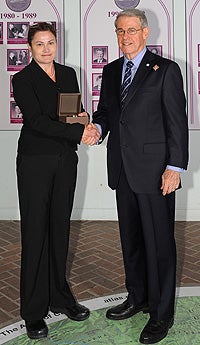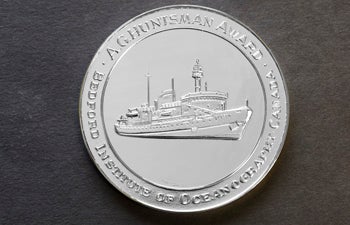Oceanographer Makes Waves
Katrina Edwards, professor of biological sciences, earth sciences and environmental studies in USC Dornsife, has been awarded the 2012 A.G. Huntsman Award for Excellence in Marine Science. She is the third woman to receive this award in the foundation’s 32-year history.
Edwards was honored for her pioneering oceanographic research, which focuses on the microbiology of the biosphere that lies beneath the ocean floor, also known as “intraterrestrial life.”
Taking a leadership role in organizing the deep biosphere research community, Edwards serves on numerous integrated ocean drilling program steering committees, and initiated and leads an international deep biosphere project in the mid-Atlantic. Edwards also heads the U.S. National Science Foundation-supported Fe-Oxidizing Microbial Observatory Project on Loihi Seamount.
Recently, she took the lead in establishing a $25 million NSF-Science and Technology Center dedicated to the study of the deep biosphere of Earth, which involves 29 Universities and research centers. She is now director of this project based in Los Angeles known as the Center for Dark Energy Biosphere Investigations.
Over the past two years her team has conducted research at three sites in the Atlantic ocean, drilling holes deep into the ocean floor — nearly three miles from the surface in some places — in order to study how life thrives in sediments and rock below the water, where an estimated nearly one-third of the earth’s biomass exists.
Edwards blogged for Scientific American about her experiences over her many months on the research ship.

Katrina Edwards of USC Dornsife is congratulated after receiving the 2012 Huntsman Award by J. J. Grant, the lieutenant governor of Nova Scotia. Photo by Kelly Bentham.
Established in 1980 by the Canadian marine science community, the A.G. Huntsman Award recognizes marine scientists throughout the world who have produced excellent research and made outstanding contributions to the field. On Nov. 15, Edwards traveled to Halifax, Nova Scotia, for the award ceremony, where she also gave a lecture on her research.
“It’s a huge honor to me, and unexpected,” Edwards said. “It’s nice to be recognized for the work I’ve put into my career. It’s also really nice to be recognized through this award in the field of oceanography because I wasn’t trained in it; I was trained in continental research as a microbiologist and as a geochemist. So, I feel like I’m really an oceanographer now.”
Some of Edwards’ most recent research indicates that there is a substantial population of bacteria harbored in the porous rock of the oceanic crust.
“It’s really exciting because this is something that has not been known previously. I’m a rock person, so I study the microbiological communities in the oceanic crust, which is very unknown territory.
“We developed this new tool that we can send down into the crust to scan the walls of the holes that we drill and detect microbial life. So, we were able to detect a substantial presence of spore-forming bacteria there.”
The larger significance of identifying this ecosystem is the potentially broad ramifications for how the oceans operate as a whole — the larger ecosystem. Edwards’ research sheds light on the reciprocal interactions between microbes, rocks and minerals in the ocean’s crust and how these interactions influence global biogeochemical processes.

Established in 1980 by the Canadian marine science community, the A.G. Huntsman Award for Excellence in Marine Science recognizes those throughout the world who have produced excellent research and made outstanding contributions to the field. Photo by Kelly Bentham.
“Just a few years ago, we didn’t even know that there was an ecosystem down there, and now we do. You can imagine how significantly the presence and activity of such an ecosystem would contribute to the functions of our global biogeochemical cycles, such as the carbon cycle. Now we know there’s all this carbon down there being cycled by these microbial communities, which has huge ramifications for how that biochemical cycle operates. And then there are the cycles of nitrogen, phosphorus, iron and so on — it just goes on and on.”
After she completes her most recent data analysis on dry land, Edwards plans to resume her oceanic research later this year and on into next year, when the research team will be investigating at a new site near Costa Rica.
“And so my life at sea continues,” Edwards smiled.